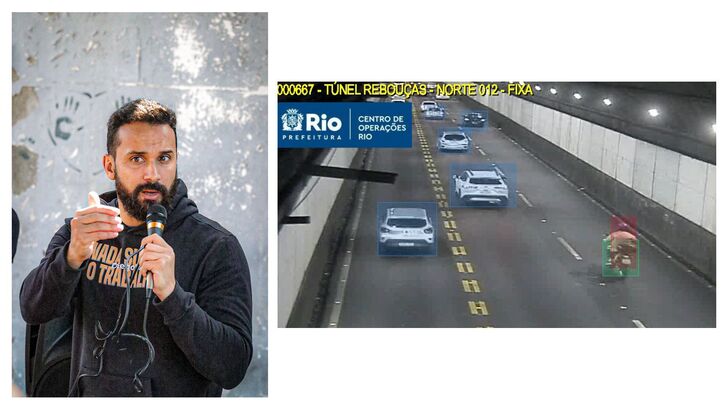Diego Vaz, a candidate for Rio de Janeiro's state congress, has unveiled an ambitious plan to implement an artificial intelligence (AI) system to combat crime and improve urban management in the city.
The proposed system would leverage Rio's existing CCTV infrastructure to detect and potentially prevent criminal activity in real-time. Vaz envisions AI capabilities that could identify suspicious behavior patterns, detect weapons, and track stolen vehicles.
"We can employ AI with our city cameras to aid in crime prevention," Vaz said. "For example, the system could identify unusual crowd movements that might indicate an ongoing assault or robbery, allowing for faster response times."
Vaz's plan extends beyond simple surveillance. He proposes using AI to analyze crime patterns and predict potential hotspots, allowing for more efficient allocation of police resources. The candidate also suggests implementing AI-powered scanners on highways to detect illegal arms and drug trafficking.
"By using heat sensors and AI analysis, we could identify trucks carrying suspiciously heavy or unevenly distributed loads, which might indicate the transport of illegal weapons or drugs," Vaz explained.
The proposal comes amid ongoing concerns about crime rates in Rio de Janeiro. Vaz emphasized that the AI system would be subject to human oversight to address potential privacy concerns and biases, particularly in facial recognition technologies.
As a former vice mayor of Rio's North Zone, Vaz has experience implementing technological solutions in urban governance. He previously launched a WhatsApp-based system allowing citizens to report local issues directly to city officials, which reportedly reduced problem resolution times from up to 30 days to just a few days in many cases.
The AI proposal extends beyond crime prevention, with Vaz suggesting applications in traffic management, public transportation, and infrastructure maintenance. One innovative idea involves equipping city vehicles, including buses and garbage trucks, with cameras and sensors to automatically detect and report issues such as road damage, unauthorized advertising, or accumulating garbage.
"This could create a comprehensive database to inform and streamline city services," Vaz explained. "We can mount a huge base of data and start to act on that with proactive city services."
Vaz also proposes using AI to improve public transportation efficiency, building on his previous work implementing a Bus Rapid Transit (BRT) system that significantly reduced commute times for many Rio residents.
The efficacy and implementation of AI-driven approaches to urban issues remain subjects of debate among policy experts. Critics raise concerns about privacy implications and potential technological biases, particularly in facial recognition systems.
"We need to use the technology, but we also need to have always a human inside by side to look after and see what they are doing," Vaz acknowledged, addressing these concerns.
Rio de Janeiro's exploration of AI in urban governance aligns with a growing global trend of cities leveraging technology to address persistent urban challenges. Vaz sees this as an opportunity to make government more responsive and accessible to citizens, particularly in underserved areas of Rio.
"To be a good public servant, you must have this sense of empathy," Vaz asserted. "It's about understanding and addressing the real needs of citizens."
Elections for the state congress of Rio de Janeiro are scheduled for 6 October 2024.
For more information, contact:
Dima Vasilenco
Good Advice PR
Website of Source: https://www.instagram.com/didivaz/
Source: Story.KISSPR.com
Release ID: 1131205

